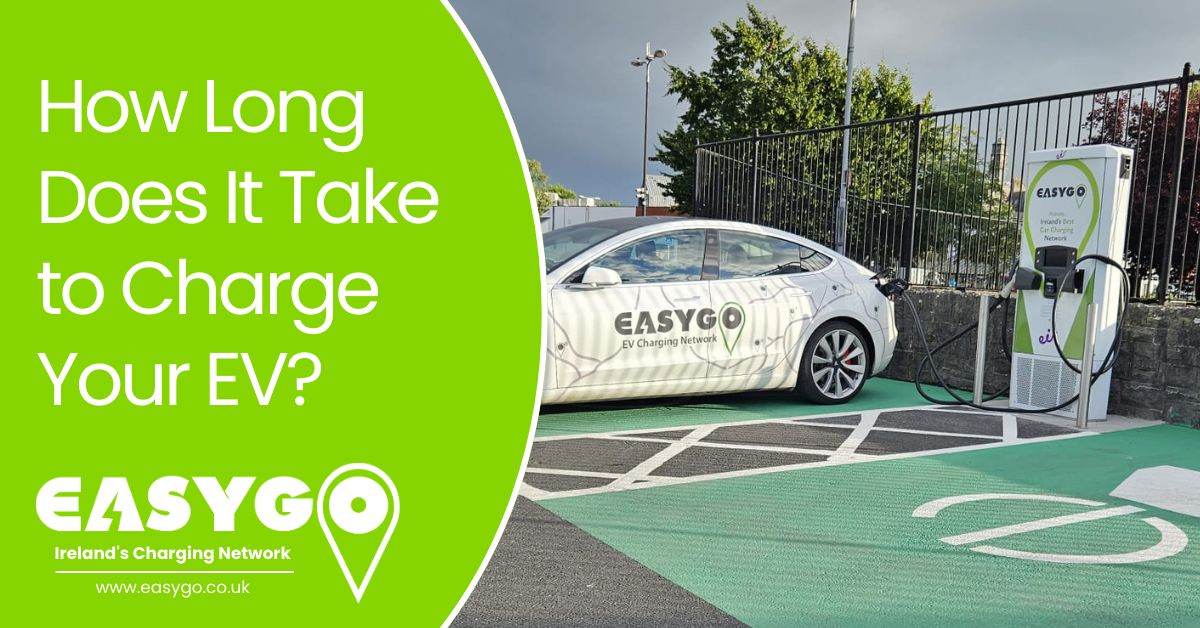
14 Dec How Long Does It Take to Charge Your Electric Car?
Electric vehicle (EV) adoption is on the rise. Recent Central Statistics Office (CSO) figures showed a 52% increase in the number of EVs licensed in Ireland for the first nine months of 2023 compared to the same period last year. Now, many new EV drivers will be navigating the next stage of their EV journeys and may wonder where they should charge and how long it takes. At EasyGo, we’ve seen many drivers implement the ‘ABC’ rule – Always Be Charging, meaning charging when you stop, not stopping to charge. In this blog, we will discuss the different factors that affect charging times and how you can ensure that you are prepared for any journey you need to take, whether it’s short or long.
Factors That Affect Charging Times
Battery Size
According to Energy5, smaller electric vehicles that are more affordable have a range of 80-100 miles or approximately 128-160km, while more expensive cars with larger batteries have a range of up to 300 miles or around 482km from one single charge. For new drivers who are considering purchasing an EV, it’s important to be aware of your required needs. For example, a larger battery will be more suitable for a driver who travels long distances for work.
Research by the SEAI suggests that even though EV batteries can gradually decline with use, many dealers have a warranty of 160,000km on their batteries which means that a decline will take years to occur. However, as battery efficiency decreases, this is an element that can affect the charging speed of an EV.
Temperature
Another factor that affects charging speeds is temperature. According to CleanTechnica, cold temperatures have a significant effect on EV charging times due to cold weather slowing the chemical and physical reactions within batteries that help charge your EVs. EVs have a reduced range when driving in cold weather, which means that, per charge, they will drive shorter distances. When preparing for your trip, it is important to be aware of the weather and plan your charging stops accordingly. Most electric vehicles have temperature regulation installed within the battery management system which helps manage the battery’s temperature and prevent overcharging. Additionally, in colder temperatures, it is important to try to minimise the use of systems like air conditioning as an EVs battery life will be reduced faster.
Charger Power Output
When charging your EV, another factor that may affect the charge speed is charger power output. The power output is measured in kilowatts (kW) and the higher this number is, the faster your EV will charge. Most public chargers in the UK and Ireland have a power output of 7kW or 22kW, while fast chargers have a power output of 50kW or more. As connections vary, home and business EV chargers can have different power outputs. This means that charging speeds and the range of your EV will depend on the location you charge at. As a member of the EasyGo network, our drivers have access to a range of fast-charging DC chargers (50kW+) across the island of Ireland, providing you with top charging speeds required to reach your destinations. The EasyGo team regularly maintain charging points, ensuring that we deliver the EV infrastructure that drivers need to travel any distance, long or short.
Average Charging Speeds
Keeping all the above in mind, average charging speeds can take anywhere from 30 minutes to 8 hours. On average, it takes just under 8 hours to charge an EV with a battery of 60kWh from empty to full using a 7kW charging point. Rapid charging and home charging will be respectively faster and slower, as the charger power outputs differ.
When planning your journey, it is important to ensure that you are aware of these averages and that your EV has enough charge to get your destination, allowing flexibility in charging. Charging while you are working or overnight can help ensure that your battery is fully charged and ready to go. EasyGo drivers can avail of our interoperable network, allowing cross-border charging and have access to over 50,000 chargers across the EasyGo, ESB and IONITY/Circle K charging networks.
How to Calculate Average Charging Speeds
If you are looking to find out more specific times for charging your EV, you can divide the battery size (kWh) by the charger power (kW), which will give you an exact charging time for your vehicle. Websites and tools such as Home Charging Stations allow drivers to input their battery and charging output details and calculates the charging time for the EV. The site also provides the charging time required to travel certain distances, allowing drivers to plan accordingly for their journeys. EasyGo’s easy-to-use app provides users with live status and availability updates of the available chargers across the island of Island.
Join Our Growing EV Network
Like any vehicle, one of the most important aspects of owning an EV is understanding its capabilities and taking care of it to ensure it performs up to speed. As the technology evolves, advancements in charging infrastructure, battery technology and charger technology will lead to faster charging times. At EasyGo, we are leading the way in creating a charging infrastructure that allows our drivers to make their journeys efficiently and without range anxiety.
For more information on how to sign up and access the EasyGo network, click here or contact us at sales@easygo.co.uk.


